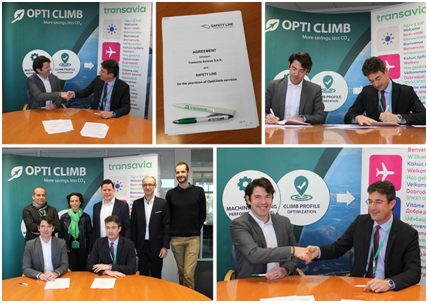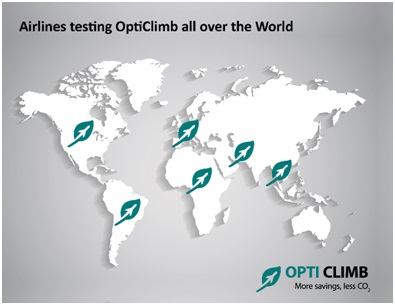Transavia France signs an agreement with Paris based start-up Safety Line to reduce its 2018 carbon footprint by 6500 tonnes!
18 Dec 2017
{{vendor.Name}}
Connect with Aircraft IT
Sign up to the Aircraft IT twitter feed for all the aviation industry's latest IT related news
Click here to learn about free Membership to Aircraft IT
Transavia France signs an agreement with Paris based start-up Safety Line to reduce its 2018 carbon footprint by 6500 tonnes!
Transavia, the low-cost airline of the Air France-KLM Group, and Paris based start-up Safety Line signed an agreement Monday December 18th 2017. Starting from 2018, all Transavia pilots will implement Opticlimb, an Artificial Intelligence solution combining historical flight data and real-time flight conditions to compute optimal climb profiles allowing to reduce fuel consumption. OptiClimb therefore allows to both reduce fuel costs and limit carbon emissions. On the basis of 5 to 10% savings of climb fuel, the airline hopes to achieve fuel savings of more than 2000 metric tons by 2019.

A target of 2000 metric tons less fuel consumed in 2018, for 6500 metric tons less CO2 emissions The climb phase consumes the most fuel. This is what led Safety Line to come up with « OptiClimb ». Thanks to OptiClimb, Transavia looks forward to optimizing climb profiles in order to reduce its fuel consumption and thereby its carbon footprint. Transavia France CEO Nathalie Stubler, stated : « The signature of this partnership is the fruit of joint efforts over a number of months between the Safety Line team and the Transavia teams. Deploying OptiClimb on all of our flights will allow us to reduce CO2 emissions and fuel consumption for a key portion of the flight, the climb phase. This partnership is an additional step in our endeavours to work with companies who offer innovative solutions, with a view to further improve Transavia’s performance. »
Based on test results over the last two years, OptiClimb allows to save between 70 to 80 kg of fuel for each climb. This means over 2000 metric tons of fuel will be saved by 2019.

2 years of tests
Leading up to the signature of this agreement, Transavia and Safety Line have worked together for the last 2 years, test campaign after test campaign. This project, led by Transavia France, has involved joint work by Transavia’s french and dutch teams. This cooperation has allowed the development of an innovative solution with solid potential – Transavia and Safety Line have the joint ambition of extending fuel savings to the cruise phase in the medium to long term.
Start-ups at the heart of Transavia’s strategy
Since its creation, Transavia France has been striving to implement innovative solutions to improve its
performance.
Transavia structures its outreach to start-ups around three main development priorities:
– Innovations in the quality of service to passengers;
– Optimisation of the airline’s operational performance;
– Improvement of the airline’s environmental footprint.
Transavia was the first airline to partner up with Safety Line, who is now testing OptiClimb with 22 other airlines. Safety Line’s founder and CEO, Pierre Jouniaux, stated: « We are proud to announce Transavia as first customer for OptiClimb. Thanks to a close cooperation with Transavia’s management and pilots and over 2000 flight test, we were able to validate the results of several years of research jointly led with INRIA/Polytechnique, France’s lead research lab for Data Sciences. If all commercial aircraft carrying 100 passengers and above were to implement OptiClimb, yearly CO2 emissions could be reduced by 4,5 million metric tons, or the equivalent of the carbon footprint of the city of Paris. Thanks to this partnership with Transavia, who are always eager to innovate, we look forward to exploring further opportunities to save fuel on other flight phases ».
